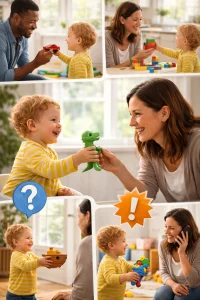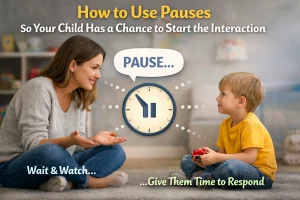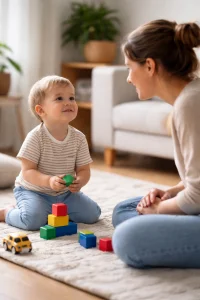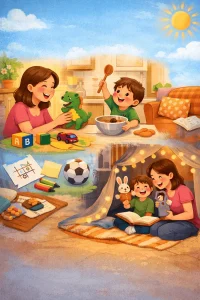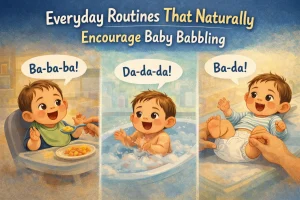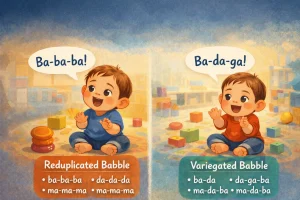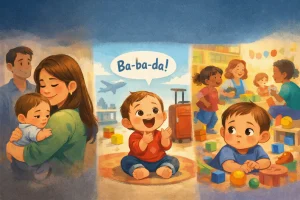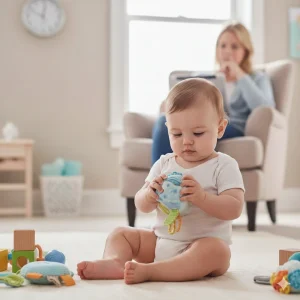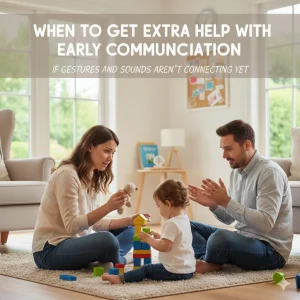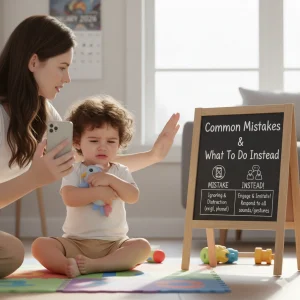How to Help Your Toddler Start Talking in Two-Word Phrases
Last Updated: June 26, 2025
Is your toddler saying a few single words but not yet putting them together like “more juice” or “mama come”? You’re not alone—and you’re not doing anything wrong. Learning to speak in two-word phrases is a big step in your child’s language journey. It shows that they’re starting to understand how words work together to express bigger ideas.
Every child grows at their own pace, and some just need a little extra support to get there. The good news? There are plenty of simple, everyday strategies you can try at home to help your toddler start using two-word phrases naturally. In this guide, we’ll break down what’s typical, what you can do, and when it might be time to seek help.
Free Speech Help for Kids
Concerned about speech delays? Book a free consultation with our expert speech therapist and get guidance tailored to your child’s needs.
What Are Two-Word Phrases in Toddlers?
By the time toddlers reach around 18 to 24 months, many start combining two words to express simple thoughts. These early word pairs are a big milestone—they show that your child is beginning to connect words and ideas.
Some common examples of two-word phrases include:
| Everyday Phrases | Action Phrases | Descriptive Phrases |
|---|---|---|
| “More juice” | “Go car” | “Big ball” |
| “Mama come” | “Eat cookie” | “Red truck” |
| “All done” | “Throw ball” | “Soft teddy” |
| “Dada bye-bye” | “Open door” | “Hot soup” |
These phrases may seem small, but they’re important building blocks. When toddlers combine a noun and a verb (“Dog run”) or a noun and an adjective (“Big car”), they’re showing progress in both language and thinking skills.
Read More: Speech Development Milestones: Your Child’s Talking Journey
When Do Toddlers Start Using Two-Word Combinations?
Most toddlers begin to use two-word phrases between 18 and 24 months. But just like walking or sleeping through the night, there’s a wide range of what’s “normal.” Some children might start a bit earlier, while others take more time.
Here’s a general guide:
| Age Range | Typical Speech Behavior |
|---|---|
| 12–18 months | Uses single words like “mama,” “ball,” “bye” |
| 18–24 months | Starts combining 2 words like “more milk,” “go car” |
| 24–30 months | Builds 2–3 word sentences like “want more juice” |
If your child understands what you say but isn’t yet combining words, that’s not always a cause for concern. Sometimes they just need gentle encouragement and daily interaction.
Why Isn’t My Toddler Using Two-Word Phrases Yet?
It’s easy to worry when other kids around the same age seem to be speaking more—but it’s important to remember that toddlers develop speech at different speeds. Still, if your child is saying just single words and hasn’t started putting them together, you might wonder what’s going on.
Let’s explore a few common reasons behind delayed two-word speech.
Common Reasons for Delayed Two-Word Speech
Here are some of the most frequent (and often manageable) reasons why toddlers may not yet be combining words:
1. Late Talker Tendencies
Some toddlers are what we call “late talkers.” They understand what you say but are slower to speak. These kids often catch up naturally with the right support at home.
2. Expressive Language Delay
This is when a child has difficulty using words to express themselves, even though they may understand language well. It’s a good idea to consult a speech-language therapist if this continues beyond age two.
3. Lack of Verbal Modeling or Interaction
Toddlers learn speech by hearing it. If a child isn’t exposed to much back-and-forth conversation, it can slow down their speech development. Talking, reading, and playing regularly can make a big difference.
4. Screen Time vs Talk Time Imbalance
Too much screen time can reduce the amount of real-life interaction your child gets. While some educational shows are fine in small doses, face-to-face conversation is what truly builds speech skills.
Should I Be Worried if My 2-Year-Old Only Uses Single Words?
Mild delays are more common than you might think. If your toddler is saying a few single words, understands instructions, and gestures to communicate, they may just need time—or a little nudge.
However, it’s worth checking in with a professional if your 2-year-old:
- Says fewer than 50 words
- Isn’t combining words like “more milk” or “want toy”
- Doesn’t respond to their name
- Rarely points, makes eye contact, or tries to communicate
- Shows little interest in people or surroundings
Here’s a simple overview:
| Concern | When to Seek Help |
|---|---|
| Only using single words | After 24 months with little progress |
| Poor understanding | Doesn’t follow simple commands like “Come here” |
| No interest in speaking | Avoids interaction or has limited communication |
How to Encourage Two-Word Phrases in Your Toddler
When your toddler starts using two-word phrases, it’s a big step forward in communication. If your child is mostly using single words right now, don’t worry—there are simple, everyday ways you can gently guide them toward combining words. These strategies are easy to try at home and work well when done consistently.
Use Repetition and Simple Word Pairing
One of the easiest ways to help your toddler speak in two-word phrases is to use clear, simple pairs of words again and again.
Try phrases like:
- “More milk”
- “Go car”
- “Sit down”
- “All done”
- “Big ball”
Repetition helps your child understand how words work together. Use the same phrases during meals, play, and daily routines. Over time, they’ll start to copy you!
Talk About What You’re Doing – Everyday Language Modeling
Narrate your actions using two-word phrases as you go about your day. This is called language modeling—and it’s incredibly effective.
For example:
- “Mommy cooking” while you’re in the kitchen
- “Daddy driving” when you’re in the car
- “Washing hands” before meals
- “Brushing teeth” during bedtime
Tip: Speak slowly and clearly. No need to force your child to repeat you—just let them hear language in real situations.
Expand on Your Child’s Single Words
If your toddler says just one word, you can build on it to help them learn two-word combinations.
For example:
| Child Says… | You Respond With… |
|---|---|
| “Ball” | “Throw ball” or “Big ball” |
| “Juice” | “More juice” |
| “Dog” | “Brown dog” or “Dog bark” |
Use Playtime to Teach Two-Word Phrases
Play is the perfect time to introduce short phrases naturally. Choose toys that allow for movement, interaction, or roleplay.
Here are a few examples:
- “Push car” when rolling toy cars
- “Feed doll” during pretend play
- “Throw ball” when playing outside
- “Fix truck” with toy tools
- “Pop bubbles” while playing with a bubble wand
Keep it fun and pressure-free. Repeat the phrases a few times while playing—your toddler may surprise you by repeating them back.
Read Books with Predictable Word Patterns
Books are a powerful tool for language growth—especially those with repetitive, rhythmic phrases. Look for toddler books that use the same sentence pattern over and over.
Try books with lines like:
- “I see a…”
- “Where is the…?”
- “Go away…”
- “Time to…”
Read slowly and pause after each phrase. You can also let your toddler fill in a missing word if they’re ready.
Best Activities and Games to Teach Two-Word Combinations
You don’t need flashcards or worksheets to help your toddler start using two-word phrases. In fact, some of the best learning happens through play! For more inspiration, check out these fun speech activities at home designed by speech experts
Below are a few fun and simple ideas to get your toddler talking more—and combining words naturally.
Fun Ways to Encourage Talking – Name + Action Games
This is an easy game where you say a person’s name followed by an action. It teaches sentence rhythm and helps toddlers learn how actions pair with people.
Examples:
| You Say… | While Doing This… |
|---|---|
| “Daddy jump!” | Dad jumps up with a big smile |
| “Mama clap!” | Mom claps hands |
| “Baby run!” | Run together with your child |
This not only builds speech but also strengthens understanding of who is doing what.
Role Play with Dolls or Animals
Pretend play is a goldmine for language development. Use dolls, stuffed animals, or animal figures to act out little scenes.
Try phrases like:
- “Feed baby”
- “Dog sleep”
- “Lion roar”
- “Teddy sit”
Let your toddler move the toys around while you talk. Then pause and see if they try copying the words or making up their own two-word combos.
Bubble Pop + Action Words
Blowing bubbles is a favorite activity for most toddlers—and a great way to sneak in some speech practice!
Use action words while playing:
| Action | Two-Word Phrase |
|---|---|
| Blowing | “Blow bubbles” |
| Popping | “Pop bubbles” |
| Catching | “Catch bubbles” |
Repeat the words with energy and excitement. Many toddlers love to say “Pop bubbles!” again and again.
Songs with Fill-in-the-Blanks
Singing familiar songs helps your child predict and fill in missing words. Choose songs with simple phrases and repeatable patterns.
Try this:
- Sing: “Old MacDonald had a…” (pause)
Your toddler may fill in “farm!” - Or: “Twinkle twinkle little…” (wait)
Let them say “star!”
Songs like these help your child feel confident using known words and slowly encourage them to string more together.
When to Seek Help for Speech Delay in Toddlers
If your child isn’t combining words yet, you might be wondering “Is this normal, or should I be concerned?” Many toddlers take a little extra time to reach certain milestones, but there are some signs that tell you when it’s time to check in with a professional.
Signs You Should Talk to a Speech Therapist
If your toddler is around or past age two and:
- Isn’t using two-word phrases like “more milk” or “go car”
- Rarely makes eye contact or doesn’t respond to their name
- Has a very small vocabulary (less than 50 words by age two)
- Doesn’t try to imitate words or sounds
- Seems frustrated when trying to communicate
…it’s a good idea to speak with a speech-language therapist.
Here’s a quick table for easy reference:
| Sign | What It Might Indicate |
|---|---|
| No two-word phrases by 24 months | Possible expressive language delay |
| Very limited vocabulary | Needs language stimulation support |
| Poor eye contact or name response | Could signal social-communication delays |
| No interest in copying words/sounds | May need help with verbal engagement |
Trust your instincts: If something doesn’t feel right, getting a professional opinion can bring clarity—and early help makes a big difference.
How Wellness Hub Can Support Your Child’s Speech Journey
At Wellness Hub, we’re here to support your child’s speech development with care, expertise, and a warm, family-friendly approach. Explore our speech therapy services for toddlers to see how we tailor sessions to your child’s needs.
Here’s how we can help:
- Online and Offline Speech Therapy
Whether you’re at home or prefer in-person sessions, our programs are flexible and accessible across India and globally. - Parent Guidance Programs
We don’t just work with children—we work with you. We offer step-by-step guidance to help you support your toddler’s progress at home. - Proven Methods for Two-Word Phrase Development
Our certified speech-language pathologists use evidence-based techniques to gently encourage two-word combinations, sentence building, and confidence in communication. - Want to know if speech therapy is right for your child?
Book a free consultation with us today and get personalized advice from our team of experts.
Conclusion
Helping your toddler speak in two-word phrases doesn’t have to be hard. Use simple words during play, read fun books together, and talk about everyday things. Small steps like these make a big difference. If your child isn’t combining words yet, don’t panic—but don’t wait either. Early help works best. At Wellness Hub, our speech therapists support toddlers through fun, easy sessions—online or offline. Start early, grow strong. Your child’s words are just around the corner.
Frequently Asked Questions:
1. What are two-word phrases in toddlers?
Two-word phrases are short sentences toddlers use to share a thought. Examples include “more juice,” “mama come,” or “big car.” They usually combine a noun and a verb or a noun and an adjective.
2. When do toddlers start saying two-word phrases?
Most toddlers start using two-word phrases between 18 to 24 months. Some may begin earlier or later—every child is different.
3. Is it normal if my 2-year-old only says single words?
It can be okay, but if your child is over 2 years old and still not using two-word phrases, it’s a good idea to talk to a speech therapist for support.
4. What are signs of speech delay in toddlers?
Common signs include:
- Not using two-word phrases by age 2
- Speaking very few words
- Not responding to their name
- Limited eye contact or interaction
5. How can I help my toddler start using two-word phrases?
Talk to your child often using simple word pairs, play games that include action words, read books with repeated lines, and expand on the words they say.
6. Does screen time affect toddler speech?
Yes. Too much screen time can reduce real talking time. Face-to-face conversation is more helpful for learning speech and language skills.
7. Are there games that help with two-word speech
Yes! Try bubble play (“pop bubbles”), pretend play with dolls (“feed baby”), or action games like “daddy jump.” These encourage short, fun phrases.
8. Should I be worried if my toddler talks but doesn’t combine words?
If your child speaks but isn’t combining words by age 2, they may need help with language development. It’s best to get advice early.
9. Where can I get help for my toddler’s speech delay?
You can get support through online speech therapy for toddlers at Wellness Hub, where experts guide parents and children step by step.
10. Can I do speech activities at home or do I need a therapist?
You can start at home with everyday talk and play. But if progress is slow, a speech-language therapist can give your child a big boost.
About the Author:
Shravanaveena Gajula
M.Sc ., Speech and Language Pathology (5+ years of experience)
Shravanaveena Gajula is a dedicated Speech-Language Pathologist with a BASLP and an M.Sc in Speech and Language Pathology. With experience spanning multiple settings, including Wellness Hub , Veena specializes in a wide range of disorders from developmental issues in children to speech and language assessments in adults. Her expertise includes parent counseling, managing speech sound and fluency disorders, and creating individualized therapy programs. Veena is also PROMPT certified and an author of several insightful blogs on speech and language pathology, aiming to educate and assist caregivers in supporting their loved ones.
Book your Free Consultation Today
Parent/Caregiver Info:
Client’s Details:
* Error Message
